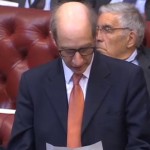Originally published on 51M:
 Lord Adonis, chairman of the National Infrastructure Commission, told peers that while challenges lay ahead with the £55.7 billion HS2 project, it would “change the country for the better” and argued it could not come soon enough.
Lord Adonis, chairman of the National Infrastructure Commission, told peers that while challenges lay ahead with the £55.7 billion HS2 project, it would “change the country for the better” and argued it could not come soon enough.
The former Labour transport secretary was speaking during the Lords debate on the second reading of the High Speed Rail (London-West Midlands) Bill.
The Nobel Lord would be be happy to claim that HS2 was his brainchild, so he was hardly going to be a model of objectivity.
His assertion that the case for HS2 had “withstood fierce debate and cross-examination”, perhaps took the biscuit for chutzpah.
When HS2 has faced cross-examination, by the Public Accounts and the Treasury Select Committees in the Commons, and the Economic Affairs Committee in the Lords, serious concerns were expressed.
Margaret Hodge’s, the then Chair of the Public Accounts Committee succinctly summed up the scheme when she remarked: “the Department for Transport had failed to present a convincing strategic case for a project with dwindling benefits and spiralling costs.”
It would have been gracious of Lord Adonis to explain what exactly had changed since that withering review.
He said: “From the outset the central argument for HS2 has been about capacity with speed and connectivity significant additional benefits.
“Since 2010 the imperative of more capacity has become greater still, which is essentially why HS2 has withstood scrutiny and controversy.
“It could not be more vital to our economic future.”
He added: “By freeing up substantial capacity on existing lines it also provides a major capacity boost for freight trains and for commuter and regional passenger services into and between the major conurbations of the country.”
Upgrading existing routes was not an option, according to Lord Adonis, who pointed out the last improvements to the West Coast mainline, had cost £9 billion, £1 billion of which was compensation to train operators for disruption. Before leaving this point it is worth noting that a significant element of the work was related to carrying out long-neglected maintenance on the line.
The peer continued: “Upgrading a busy mainline railway is like conducting open heart surgery on a moving patient. It’s hardly a compelling alternative to HS2 let alone a cheap one.”
In this respect he referred to the DfT’s assessment of alternatives based improving existing lines. The premise of this research appeared to assume such improvement schemes would proceed on the basis of achieving maximum disruption and eschew good practice as an operating principle.
HS2 has never been a trouble-free option. One has only to look at the 20 years of misery commuters, residents and businesses face with regard to redevelopment of Euston station.
In his speech the peer said: “I am not aware of a single country that has introduced high-speed rail between its major cities and now thinks that this was a mistake.
Well, he might want to ponder the experiences of Holland, Spain and France where support for high-speed rail rarely gets the rousing three cheers it once did.
The network in France is often highlighted by HS2 supporters as the blueprint this country should follow.
Many of France’s high-speed TGV trains, long hailed as the standard bearer of the nation’s rail revolution, are travelling in the slow lane, an official report revealed in 2014.
The Cour des Comptes (Audit Office) found, of the 230 TGV stations across France, many were on lines which were loss-making for the state-run SNCF company. The report suggested that the high-speed model was “running out of steam”.
Pointing to examples where the social and economic viability of new high-speed lines had been overestimated, the Audit Office highlighted a steady drop in TGV profitability since 2008.
Given the comparative higher costs of HS2, the fact that SNCF has experienced years of falling profits for the TGV, represents a stark warning to HS2 but today Lord Adonis was not about to trouble himself with such matters.

How much does Government delivery of HS2 cost compared to previous HS1 delivery approach? Possibly much more to have ad hoc Ministers and Civil Servants trying to manage in the place of leaner methods. The UK is over spending on civil engineering Infrastructure projects and the value for money of delivery will be too much per mile.